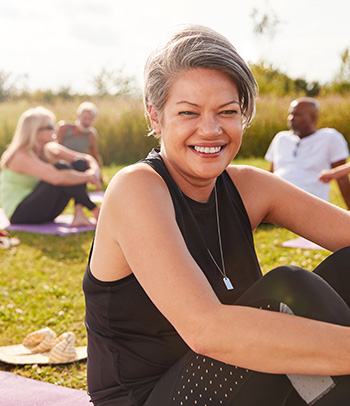Our relationships can impact us in various ways. When we argue with someone, it can make our blood pressure rise and our stress levels soar. When we feel tension with someone at work, it can make us feel on edge and irritable.
Having healthy and meaningful relationships in your life is a vital component of your physical and mental health and well-being.
In the same way, when we feel loved and valued, it makes us feel good inside. A talk with a trusted friend can relieve stress and improve our mood. All of this is linked to what’s called our social health.
Learn more about how your social health impacts your overall health and wellness and what steps you can take to improve the relationships in your life.
What Is Social Health?
According to the National Institutes of Health, social health and wellness is your ability to build healthy, supportive relationships. It includes making genuine connections with those around you. Social health is not about how many friends you have on social media or whether you’re married. Social health includes relationships of all different kinds, including family, friends, neighbors, coworkers, members of your religious organization or other social groups. Having healthy and meaningful relationships in your life is a vital component of your physical and mental health and well-being.
How Does Our Social Health Impact Us?
According to the National Library of Medicine, research suggests that a person’s physical and mental health is connected to their social health and well-being. Scientists have found that our relationships with others can have powerful effects on our health.
 People with strong social connections and social well-being enjoy many health benefits, including:
People with strong social connections and social well-being enjoy many health benefits, including:
- Boosted immune systems
- Healthier hearts
- Lower blood pressure
- Reduced mortality risk
- A boost in mental health
- Better responses to stress
- Healthier lifestyle choices (For example, we may exercise more or eat better if we believe the people around us care about our choices.)
On the other hand, when we feel lonely or experience a lot of stress from unsupportive or troubling relationships, our bodies react in negative ways, including:
- Increased blood pressure
- Increased heart rate
- Greater production and release of stress hormones
- Worsened lifestyle choices such as poor nutrition, smoking and drinking too much
- Premature mortality
- Weakened immune system, increasing our chances of getting sick
- Higher rates of depression and anxiety
If the people around us can help us live longer and make us healthier, it makes sense to evaluate our relationships and put time into making meaningful and strong connections with others.
Tips for Improving Your Social Health
 Check out the tips below to help you develop a healthier social well-being:
Check out the tips below to help you develop a healthier social well-being:
- Evaluate the current state of your social health. Think about where things stand right now. What aspects of your social life give you joy? What aspects would you like to improve? What kinds of relationships are missing in your life? Do you have anyone you can turn to for support? Are you a good friend to others? By asking yourself these questions, you can get a better idea of what needs to change.
- Take care of yourself. It’s hard to show up and support others when you feel tired, stressed and rundown. Take time to relax and do things that fill you up so you have the energy to nurture your relationships. Find time to exercise, get enough sleep and do what you enjoy—whether that means watching a favorite show, reading a new book or enjoying another favorite activity.
- Limit your screen time. Screens can give us new and fun ways to connect with others through video calls, video games and social media, but too much time online can lead to increased feelings of isolation, loneliness and depression. Set healthy limits on your screen time and don’t let it interfere too much with your face-to-face relationships. Check out Establish a Healthy Balance: Reducing Your Screen Time for tips on reducing your screen time to healthy levels.
- Set healthy boundaries. If you have draining or toxic relationships, consider stepping back from them. Limit your interaction with negative people, even if that means establishing boundaries with family, friends or neighbors. Are there topics you don’t want to talk about or actions that make you feel like you’re being taken advantage of? Speak up and share when you feel upset or when something bothers you.
- Share your feelings and be open and honest with others. You don’t always have to say, “I’m fine.” You can let people in and share what’s on your mind to help you make deeper connections. At the same time, be sure you’re being an active listener for others. Be empathetic and open when people share with you. It’s not always time to give advice—sometimes an ear is enough.
- Make an effort. If you value your relationships, put the work in. Stay in touch, send a quick text or a card, or drop by to see if a friend is available for coffee, a walk, or a gym date. If you make your social health a priority and put a value on your relationships, it will make you and them stronger.
- Find new ways to connect. It might be time to think about new ways to put yourself out there. Consider the following ideas:
- Join a group or club that connects to one of your interests. You may find a local group for fishermen, a group that knits or sews, or a group that gets together to play sports.
- Look around the community for opportunities. You could volunteer somewhere, attend a church outing, or see what else is going on in your area.
- Think about group fitness at a local gym or hiking or walking groups. You can get healthier while finding new ways to connect at the same time.
- Check out Make Small Changes to Conquer Your Loneliness for more ideas on connecting with others.
- Make the first move. As an adult, it can feel hard to make new connections. But if you want to improve your social health, take a risk and reach out. Try striking up a conversation at the gym and suggest going to lunch. Or invite your neighbor on your daily walk around the block. Small steps may seem intimidating at first but may be just what you need.
- Get the support you deserve. As a Veteran, you may be having a particularly hard time making your relationships work. Maybe you’re struggling with the transition to civilian life and don’t feel connected to your “old life” anymore. Maybe you’re dealing with stressful and upsetting memories that make it hard to enjoy social activities. You may need support to improve your social health. Consider joining a support group, getting therapy or meeting with a counselor to help you work through some of the reasons you’re struggling to make meaningful connections. Check out the Department of Veterans Affairs (VA) options for mental health treatment to get started.
Resources
- The National Institutes of Health (NIH) offers a Social Wellness Toolkit that has tips, checklists and questions to help you address all different aspects of your life, including your social wellness, financial wellness, spiritual wellness and much more.
- The Centers for Disease Control and Prevention (CDC) offers articles that relate to your social and emotional health with tips on reducing stress, dealing with isolation, building healthy relationships and more.
- Make the Connection has videos and stories from other Veterans on dealing with relationship problems, as well as managing social withdrawal and isolation.
- TriWest Healthcare Alliance offers many behavioral health resources, including Tools for Coping with specific barriers to healthy relationships such as post-traumatic stress disorder (PTSD), depression, substance abuse and more.
Now that you know there’s a connection between your relationships and your health, it’s up to you to evaluate your social health and take steps to improve it.







